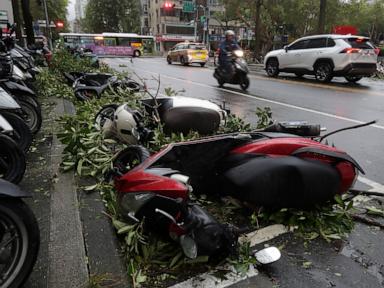To deter a war over Taiwan, threaten Chinese interests far from it

As wars rage across Europe, the Middle East and Africa, Beijing is once again rattling its saber at Taiwan. In doing so, it has drawn attention back to East Asia with a reminder that the world is at risk of an even more destructive war than those it is already facing. A battle over Taiwan would be disastrous for all sides. To prevent one, the U.S. must ensure that the People’s Republic of China (PRC) also views the cost of a conflict as unacceptably high.
The risk that Beijing attempts to forcefully “reunify” Taiwan with mainland China increases significantly if it becomes confident that three conditions have been satisfied. The first is that the People’s Liberation Army (PLA) has established sufficient local military superiority to win a fight with the U.S. and its allies in the region surrounding Taiwan. The second is that China will be able to contain the conflict to their chosen theater. Finally, that the economic fallout will be minimal.
American planners are focused on turning Taiwan into an “indigestible porcupine” to counter the first. This is necessary, but it is not enough. Focusing solely on the defense of Taiwan cedes the initiative to China, allowing them to gather their forces and focus them on their objective.
If the U.S. truly wishes to deter Beijing, it must make it clear that it will raise the stakes past what the PRC is willing to wager. As China has turned into a global power it has acquired dependencies far from its borders. The U.S. should be ready to respond to an assault on Taiwan by targeting those vulnerable assets.
The obvious starting point is another Strait — Malacca, through which 70 percent of Chinese petroleum imports pass. Simply accepting its closure is not an option for Beijing. China also depends on enormous fleets of fishing vessels. Thousands of these range well beyond Chinese shores and present ripe targets. Without naval escorts these could be easily decimated, including by allies with even modest navies.
These examples just scratch the surface. Countless Chinese military and economic vulnerabilities exist across the globe, in space and online. Each one requiring either the diversion of PLA assets to protect or a willingness to sacrifice. They also allow the U.S. military to capitalize on its greatest advantages over the PLA — an ability to strike anywhere and global alliances.
Threatening Chinese interests beyond the Taiwan Strait will force Beijing to decide whether it is willing to risk extensive economic damage and an expanded conflict in an attempt to seize Taiwan. It will also make it more challenging for the PLA to concentrate the overwhelming force necessary to do so. If they know they will also have to fight to keep Malacca open and guard their fishing fleets, it will have to divert assets that would otherwise be directed at Taiwan. As Sun Tzu once advised, “if his forces are united, separate them.”
This will require a significant mindset shift in Washington. American policy makers tend to treat conflict expansion solely as a risk to be avoided. This can be seen in the desperate attempts to restrain Israel and Ukraine from aggressively pursuing victory, even as they battle our common adversaries. It was also evident during the Global War on Terror, when the U.S. tolerated Iranian support for Iraqi insurgents with minimal consequences.
Concern is justified, particularly with a nuclear power like China. As many have warned, the tension between incumbent and rising superpowers is a tinderbox. And tit-for-tat escalations risk paving the road to a catastrophic exchange of nuclear weapons.
But it would be even more reckless to allow Beijing to believe it can define the scope of a conflict over Taiwan to its advantage, thus tempting them into launching one. Particularly since China itself is unlikely to constrain it solely to Taiwan. Attacks on American forces in Japan, Guam and other locations to prevent them from interfering are likely. President Xi Jinping may even lean on Pyongyang to attack South Korea to further distract the U.S. while he seizes Taiwan.
Rather, Washington should be explicit about what it will consider on the table if Xi decides to take a stab at Taiwan. And make it equally clear that, with the exception of military assets engaged in hostilities, mainland China will remain unmolested. This message must also be delivered skillfully, so that it does not precipitate the war it is intended to prevent.
When the Japanese attacked Pearl Harbor, they believed that a quick, decisive victory would be both the beginning and end of their war with America. That miscalculation led to four years of unrestrained warfare and millions dead. Hamas, Hezbollah and Iran similarly believed that they could limit the scope of their conflict with Israel and are now suffering the consequences of that mistake. To prevent Beijing from following in their footsteps and dragging the world further into war, the U.S. must be unambiguous that the consequences of attacking Taiwan will be intolerable.
Ultimately, the best way to prevent war with China is by making it clear to Beijing that it wouldn’t just be a war over Taiwan. It would be a war over the future of China’s global presence.
Dan Nidess is a former Marine captain and veteran of the war in Iraq who currently works in Silicon Valley.
Topics
-
As Beijing Threatens, Taiwan Looks Nervously at Trump
World - The Wall Street Journal - 3 days ago -

How Taiwan is preparing for a nighttime Chinese attack
Politics - The Hill - October 25 -

Inside Taiwan's preparations for a potential Chinese attack
Politics - The Hill - October 25 -
How far will mortgage interest rates fall in November?
Top stories - CBS News - October 31 -

Judge continues to block Florida officials from threatening TV stations over abortion ads
Health - ABC News - October 29 -

Taiwanese driver recounts his narrow escape during Typhoon Kong-rey
World - ABC News - November 1 -
How far will credit card interest rates fall in November?
Top stories - CBS News - October 24 -
How far will home equity loan interest rates drop in November?
Top stories - CBS News - November 4 -
Here's how far HELOC interest rates have dropped this year
Top stories - CBS News - November 8
More from The Hill
-

Trump's NATO tightrope: Reforming the alliance while wrangling Capitol Hill
Politics - The Hill - 25 minutes ago -

Bezos pushes back on Musk claim he said Trump would lose
Politics - The Hill - 36 minutes ago -

Former Ethics panel chair ‘wouldn’t be at all shocked’ if Gaetz report released
Politics - The Hill - 48 minutes ago -

Graham knocks ICC over Netanyahu, Gallant: 'A dangerous joke'
Politics - The Hill - 54 minutes ago -

Rahm Emanuel is a terrible choice for DNC chair
Politics - The Hill - 55 minutes ago